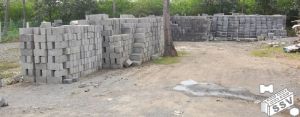
Solid Blocks
Concrete can be converted into precast masonry units of suitable size to be used for walling. Depending upon the structural requirements of masonry units, blocks can be cast to desired shape and size to facilitate construction of wall of requisite thickness and appearance. Concreting: The moulds are filled up thoroughly by using a trowel, at compacted with a surface vibrator. Pressure is exerted on the handles of the vibrator to impart the vibrations more effectively. Moulds of the compacted blocks are lifted up in the same sequence of concreting and are arranged further in the row for reuse. Filling of the moulds is done in two stages. Vibration should be stopped as soon as there is occurrence of slurry under the mould sides. The top is finished with the slurry formed at the surface and that available under the sides. Curing and Stacking: The blocks are cured on the casting yard for first 24 to 48 hrs, depending on the weather conditions. Handling before this period may damage the blocks. Half kg. of calcium chloride per bag of cement may be used in extreme cold weather to achieve this handling strength. The blocks lifted from the casting yard are stacked on a nearby level ground over a layer of sand to ensure a full surface contact. Each day’s production is accommodated in not more than two tiers of blocks. The blocks cured for three weeks by frequent sprinkling of water. This is followed by two to three weeks of air drying. It must be ensured that the block is fully dry before use in masonry, to avoid shrinkage cracks.
...more
outdoor ceramic wall tile
Thickness : 5-10 mm
Material : Ceramic
Shape : Rectangular
Size : 30 * 60 In cm
...moreBe first to Rate
Rate ThisOpening Hours